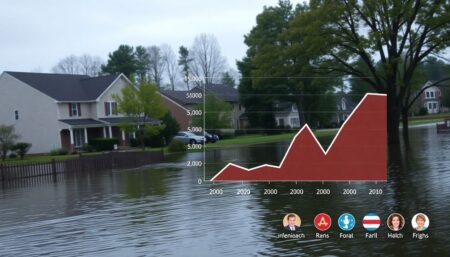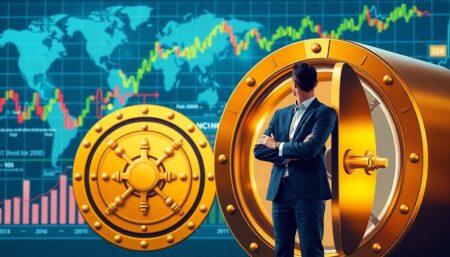As the calendar flips to a new year, one thing that’s on everyone’s mind is tax season. While it might seem far off, accountants advise that now is the perfect time to start preparing. In this article, we’ll explore why and how to get a head start on your 2024 tax returns, making the process as smooth and stress-free as possible.
Early preparation can make tax season a breeze. Here’s how to get started.
Imagine this: it’s tax season, and you’re facing a desk covered in a sea of receipts, invoices, and tax forms. The mere sight of it all could make anyone’s head spin. But for this accountant, it’s not a scene of chaos, but a puzzle waiting to be solved.
Picture the accountant, coffee in hand, calculator at the ready, and a cheerful smile. This isn’t just number-crunching; it’s a dance with digits, a symphony of sums. And then, it happens – the lightbulb moment. A solution crystallizes, and the scattered papers start to make sense.
The playful design around the accountant tells a story of its own. Calendars marking deadlines, receipts, and invoices scattered like confetti, each piece playing a part in the grand ballet of balancing the books. It’s a colorful dance of organization, and the accountant is the maestro, turning the mundane into something almost… magical.

Gather Your Documents
Gathering your essential tax documents early, such as W-2s, 1099s, and small business information, is a critical step in ensuring a smooth and stress-free tax filing process. When you start collecting these documents well ahead of the filing deadline, you give yourself ample time to address any discrepancies or missing information. This proactive approach helps you avoid the last-minute rush, which can often lead to errors and oversights. Moreover, having all your tax documents organized early allows you to maximize your deductions and credits, potentially reducing your tax liability.
Early preparation is especially important for small business owners who need to consolidate various forms of income and expense records. By compiling your small business information ahead of time, you can accurately report your earnings and take advantage of all eligible tax deductions. This includes gathering receipts, invoices, and bank statements that support your business expenses, ensuring you don’t miss out on any potential savings.
To organize your tax documents efficiently, consider the following tips:
- Create a designated folder or binder: Have a specific place where you can store all your tax-related documents as they arrive. This could be a physical folder or a digital one on your computer.
- Categorize your documents: Separate your documents into categories such as income, expenses, investments, and deductions. This will make it easier to find what you need when it’s time to file.
- Use a checklist: Make a list of all the tax documents you expect to receive, and check them off as they arrive. This will help you keep track of what you have and what you’re still missing.
- Go digital: Consider using tax preparation software or apps that allow you to upload and store your tax documents securely. Many of these tools also offer features to help you organize and categorize your documents.
Finally, don’t forget to review your documents carefully as you receive them. Double-check the information for accuracy and ensure that you have all the necessary supporting documentation. If you encounter any issues or have questions, reaching out to a tax professional early in the process can save you time and headaches down the line. By taking these steps to gather and organize your tax documents early, you’ll be well on your way to a hassle-free tax season.

Choose Your Filing Method
Filing taxes can be a daunting task, but fortunately, there are several methods to ease the process. One traditional method is working with a professional accountant. Accountants are trained to understand the intricacies of tax laws and can provide personalized advice tailored to your financial situation. They can help you navigate complex tax scenarios, maximize deductions, and ensure compliance with all relevant regulations. This approach is particularly beneficial for those with complicated tax situations, such as small business owners, freelancers, or individuals with multiple income sources.
Another popular method is using tax software. Platforms like TurboTax, H&R Block, and TaxAct offer user-friendly interfaces that guide you through the tax filing process step by step. These software solutions are designed to be intuitive, even for those with limited tax knowledge. They often include features like automatic calculations, error checking, and e-filing options. Additionally, many tax software programs offer support resources, such as FAQs, tutorials, and customer service hotlines, to assist you along the way. This method is ideal for individuals with straightforward tax situations who prefer a DIY approach.
When choosing a professional accountant, communication and comfort are key. It’s essential to find someone who understands your financial goals and can explain tax strategies in a way that makes sense to you. Here are some tips to help you find the right professional:
- Ask for referrals from friends, family, or colleagues who have had positive experiences with their accountants.
- Schedule consultations with potential accountants to discuss your needs and assess their communication style.
- Inquire about their experience and credentials, ensuring they are qualified to handle your specific tax situation.
- Consider their availability and responsiveness, as timely communication is crucial during tax season.
Ultimately, the best method for filing taxes depends on your individual needs and preferences. Whether you opt for a professional accountant or tax software, ensuring you are comfortable and well-informed throughout the process is paramount. Don’t hesitate to seek help when needed, as accurate and timely tax filing can save you money and avoid potential legal issues.

Track Your Expenses
As an independent contractor or small business owner, tracking your business expenses is more than just a good habit—it’s a critical practice that can significantly impact your bottom line. By maintaining organized records, you’ll have a clear view of your financial landscape, enabling you to make informed decisions and monitor the health of your business. Moreover, keeping meticulous records is indispensable when it comes to maximizing your tax deductions.
One of the most compelling reasons to track your business expenses is the potential for tax write-offs. The IRS allows businesses to deduct ordinary and necessary expenses incurred during the tax year. This can include a wide range of costs, such as:
- Office supplies and equipment
- Travel and meals
- Vehicle-related expenses
- Advertising and marketing
- Legal and professional services
However, to claim these deductions, you need to have accurate and detailed records that substantiate your expenses.
To effectively track your business expenses, consider implementing the following strategies:
- Separate business and personal expenses: Open a separate bank account and credit card for your business to avoid commingling funds.
- Save receipts: Keep physical or digital copies of all receipts for business-related purchases. This includes receipts for meals, travel, and other expenses that you may incur throughout the year.
- Maintain a detailed expense log: Record each expense, noting the date, amount, vendor, and purpose. This can be done using accounting software, spreadsheets, or even a simple notebook.
- Regularly review and organize your records: Set aside time each week or month to review your expenses, ensuring that all receipts are accounted for and that your records are up-to-date.
By prioritizing expense tracking and maintaining organized records, you’ll not only simplify your tax filing process but also position yourself to take advantage of every possible deduction. This proactive approach can help you reduce your taxable income, lower your tax bill, and ultimately retain more of your hard-earned revenue. Don’t let disorganization or procrastination cost you money—commit to tracking your business expenses consistently and reap the financial rewards.

Donate Wisely
Donating to nonprofit organizations isn’t just an act of kindness; it can also be a smart financial move. The IRS recognizes these generous contributions and allows taxpayers to deduct them from their taxable income. This means that when you donate to a qualified nonprofit, you can potentially lower your tax bill. It’s a win-win situation: you get to support a cause you care about while also enjoying a tax write-off.
However, not all donations are created equal in the eyes of the IRS. To ensure your generosity is tax-deductible, the organization must be tax-exempt. Here are some tips to confirm this:
- Use the IRS Tax Exempt Organization Search tool. This online tool allows you to search for organizations that are eligible to receive tax-deductible charitable contributions.
- Ask the organization directly. Most nonprofits will be happy to provide information about their tax-exempt status.
- Look for the organization’s EIN (Employer Identification Number). This is a unique nine-digit number assigned by the IRS to identify the organization.
Once you’ve confirmed the organization’s tax-exempt status, keep good records of your donations. This includes saving receipts, canceled checks, or bank statements. The IRS requires contemporaneous written acknowledgment for donations of $250 or more.
Generosity is a virtue, and being tax-smart can make your virtuous acts even more rewarding. So, go ahead, make a difference, and enjoy the tax benefits of your kindness. Just remember to do your due diligence and keep good records. Happy giving!
FAQ
What documents do I need to start preparing for tax season?
- W-2 forms
- 1099 forms
- Dependent information
- Small business records
Should I hire an accountant or use tax software?
What kinds of business expenses can I write off?
- Office supplies
- Travel expenses
- Software subscriptions
How can I ensure my donations are tax-deductible?
- Red Cross
- Local humane society
Always keep records of your donations for tax purposes.









